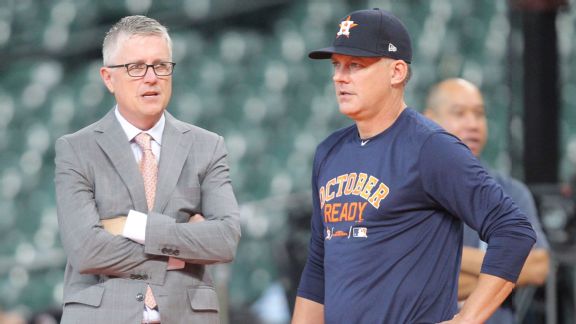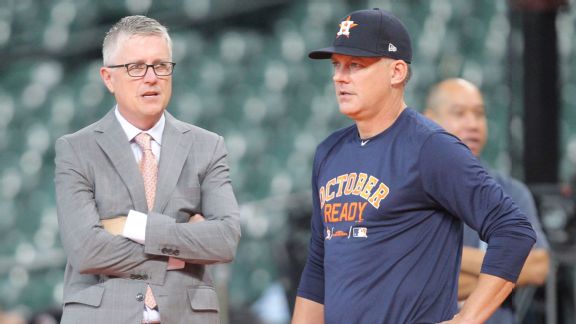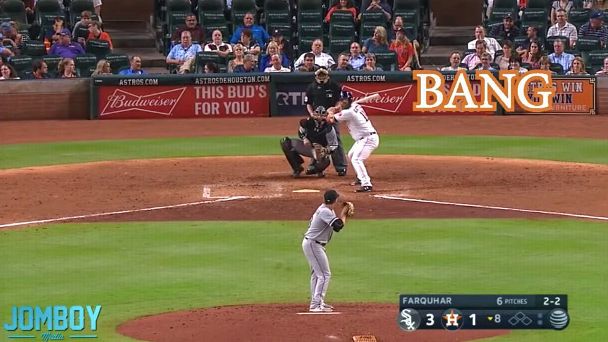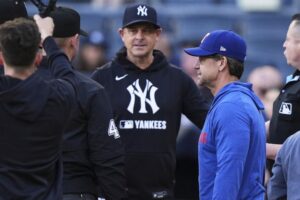Astros’ Cheating Won’t be Easily Forgotten by Major Leaguers

Luhnow and Hinch were fired as Astros G.M. and Mgr.
By Scott Mandel
Baseball is burning. Opposing players are pummeling the Houston Astros as the fallout from their cheating scandal refuses to dissipate, and fans are frothing for vengeance after the players involved were spared from discipline by the league. Commissioner Rob Manfred is trying to wrap his arms around it all only for the anarchy to keep expanding. Every day is something new. Saturday, it was bad tattoos. Sunday, the commissioner will talk and try to explain how this all unfolded on his watch. Monday, if it came out that the Astros used furtive earpieces or Bluetooth buzzers or a robust artificial-intelligence operation to gain an advantage, it would surprise absolutely nobody.
There is no order. Just pure, distilled chaos.
It’s not going away any time soon. This is a reality every person involved should learn to understand sooner than later. Not because this is some media creation that thirsts for the mother’s milk of controversy and giddily gawks at the overnight transformation of Major League Baseball from the league of Charlie Chaplins into a full-flavored copy of the NBA, where no sacred cows exist. No, this is now about something much more primal: survival.
The tentacles of baseball’s cheating scandal are long and abundant. All of the Astros players, past and present. Their front-office members. Their opponents. Manfred and his associates. The MLB Players Association. Team owners. Fired general manager Jeff Luhnow and manager AJ Hinch. Alex Cora and Carlos Beltran, both of whom lost managing jobs on account of their involvement. It is a wide swath of characters with competing interests and self-preservation in mind, each with a story to tell. Already those involved are trying to game the timing, to ensure that their version does not find itself lost amid the morass of takes.
The prevailing narrative Saturday came from Astros shortstop Carlos Correa, who originally declined comment through a team spokesman and then granted a wild interview to MLB Network in which he told the reigning National League MVP to “shut the f— up,” reiterated that the Astros’ 2017 World Series title was not won through ill-gotten gains and introduced the world to Jose Altuve ‘s unfortunate collarbone tattoo.
A quick backgrounder, since that last sentence sounds like a Mad Lib: Los Angeles Dodgers star Cody Bellinger unloaded on the Astros on Friday, a day after the beginning of their mea culpa tour turned disastrous, by saying Altuve “stole” the American League MVP award from New York Yankees star Aaron Judge in 2017 and that the Astros “stole the ring from us” by beating the Dodgers for the 2017 championship. Bellinger was the latest player to flout the game’s long-held omertà and unload a shotgun into the barrel in which the Astros swim these days. Dragging the Astros is the sport within a sport.
Correa decided to come clean with something that data compiled by an Astros fan named Tony Adams had seemed to show: Altuve did not like when his teammates banged on a trash can adjacent to the dugout to alert him of the coming pitch type. Adams logged more than 8,000 pitches from home games during the 2017 season and heard trash-can bangs on 13.2%. Of the 866 pitches to Altuve, there were bangs on only 24 — 2.8%.
MLB punishes Astros

“For [Bellinger] to go out there and defame Jose Altuve’s name like that — it doesn’t sit right with me,” Correa said. “‘Cause the man plays the game clean.”
Knowing the data, and having been told by another player on the 2017 Astros that Altuve did not engage regularly in the trash-can scheme, I had asked him Thursday to explain why.
“I know your question,” Altuve said. “I really appreciate your question. It’s good. But I want to take this as a team. I think we’re all at the same level right now of feeling the way we’re feeling about doing what we did. I’m not here to say you and you more than you and you. We’re a team. I’m not saying this today. I always say this is a team. And if we are something, we all are something.”
For all of the fallout from that day, particularly after owner Jim Crane’s contraction of foot-in-mouth disease, Altuve’s answer stood out as not just sincere but commendable — the sort of thing other players in baseball in different circumstances would respect and the rare instance, in this whole scandal, of someone not obviously acting in his own self-interest. Altuve could have absolved himself. He could have gone full Shaggy. He instead subjected himself to the fusillade of condemnation that would come.
Because it’s true: He didn’t stop it. No one did. And that’s a question the players lobbing grenades at the Astros ought to ask themselves, too. If they truly plumb the depths of their self-awareness, how many believe they would not simply be conscientious objectors as the data suggests Altuve was but entirely blow up a scheme being used by a team barreling toward 101 wins?
Social media vs. MLB

How the internet helped crack the Astros’ sign-stealing case.
What the Astros did was clearly cheating, clearly wrong, clearly a black mark on their championship. It is also naïve to think less hubristic versions of sign-stealing weren’t going on elsewhere and that had those been accelerated the players would have put a stop to them.
The defiance emanating from the Astros’ clubhouse, even after their apologies, is coated in this let-he-who-is-without-sin-cast-stones mentality. Correa besmirched Bellinger for suggesting Houston was cheating for the last three years, saying it occurred only in 2017. Ken Rosenthal immediately corrected him, saying Manfred’s report said the Astros had stolen signs in 2018, too. Correa danced around this, landing ultimately on a judgment of Bellinger daring to vilify Altuve and the Astros: “With me, that doesn’t sit right.”
The problem, of course, is that the moment the Astros decided to start banging on trash cans, they forfeited any sort of moral authority that allows them to differentiate between right and wrong. They might as well have KICK ME stitched across the backs of their jerseys instead of their last names, and it’s because of their collective action. So as satisfying as it feels to try and speak into existence this notion that their championship isn’t irreparably tainted, to drop F-bombs on the haters, to stand up for Altuve like Altuve stood up for him and the rest of the Astros who did think enough of the trash-can scheme to use it for months, it runs the risk of sounding like Charlie Brown’s teacher.
Correa’s defense stretched past aggrieved and into comedic during his denial that the Astros had used wearable buzzers during the 2019 season to signal the coming pitch. Bellinger and Yankees catcher Gary Sanchez had questioned why, after Altuve hit a walk-off home run to send the Astros to the World Series this year, he did not want his jersey ripped off. First, Correa said, Altuve’s wife had expressed discomfort with it when he and Kemp unclothed Altuve earlier in the season.
“The second reason that he don’t want me to talk about this, but I’m gonna say it, is because he’s got an unfinished tattoo on his collarbone, right here, that, honestly, looked terrible,” Correa said. “It was a bad tattoo. And he didn’t want nobody to see it. He didn’t want to show it at all.”
A bad tattoo. Welcome to baseball in 2020.
There’s more to come. There’s always more with this Astros story that drips out with all the efficiency of a broken faucet. The coming days, weeks, months will teem with more details, explanations, facts. Manfred’s report looks more and more like a Polaroid that needs to be shaken. The manifold characters all have their versions of the story to tell. There are reputations to be salvaged, careers to be saved, sides to be taken. This is the just the beginning.
It’s never too early to start or join a fantasy baseball league for the 2020 season.
The next step is Manfred addressing the media Sunday in North Port, Fla. As commissioner, the sport’s well-being ultimately falls on him. And while the ultimate fallout of the scandal is unclear — is it, in a perverse way, actually driving interest to baseball, or does the stench of misconduct have the opposite effect? — he must answer for his role in it reaching this point, where a new fire smolders every day.
And rest assured, potential arson abounds. What will Beltran, slimed and smeared, say when he speaks out? How will MLB, if at all, punish the Boston Red Sox, whom they’re investigating for stealing signs in 2018? What will the punishment for Cora, who is expected to be suspended, be? How can the MLBPA preach solidarity when its members attack one another on the daily? Will others join former MLB pitcher Mike Bolsinger and a daily fantasy player in filing lawsuits against the Astros and the league? Who will speak out next? What will he say?
In a week, spring-training games begin. The Astros will play the Washington Nationals, who beat them in the 2019 World Series. Across the sport, eyes will be trained on the game to see if Nationals pitchers intentionally throw at Astros hitters. Houston manager Dusty Baker tried to preempt any retaliation Saturday, asking MLB to do all it can to prevent premeditated beanings. It only served to draw the ire of those who see the inevitability of what is to come: a pitcher who dots an Astros hitter with a fastball to send a message that what they did is indefensible will receive a longer suspension than any of the Astros did for their indefensible acts.
Yes, baseball is burning, and nobody — not the Astros, not Manfred, not the rest of the players — can stop it. Only time will slow it, and until then, as baseball’s cheating scandal metastasizes, as it dirties all it touches, remember that what caused it in the first place will guide its direction going forward: the choices of individuals looking out for themselves.





